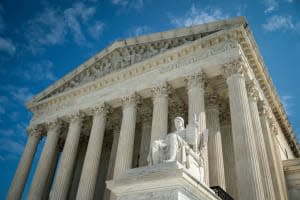The case for ending judicial review
- Oops!Something went wrong.Please try again later.

Forget packing the court. What if the U.S. Supreme Court was neutered, instead?
It's a possibility. A presidential commission considering reforms to the court last Wednesday heard from Nikolas Bowie, an associate professor at Harvard Law School. He argued that it is time to end the high court's power of "judicial review," which gives it the authority to declare a law unconstitutional and thus usually gives SCOTUS the last word in battles with the legislative and executive branches.
The Supreme Court's "relationship to Congress is not that of an umpire overseeing a batter, but of a rider overseeing a horse," Bowie told the commission in his written testimony. "Most of the time, the court gives Congress free rein to act as it pleases. But the court remains in the saddle, ready to pull on the reins when Congress moves to disrupt hierarchies of wealth or status."
When President Biden appointed the commission in April, public and media attention focused mostly on progressive hopes to pack the court with additional justices — the new seats to be occupied by Democratic appointees, of course — and reverse the court's conservative tilt. As Bowie's testimony indicates, the commission is actually considering a much wider array of possible changes to the judicial branch.
And the conversation involves more than mere technical changes, like court size or term limits for justices. Instead, it strikes at the very heart of the Supreme Court's role in American governance, politics, and culture. Without judicial review, can the court be the court?
Judicial review, of course, is mentioned nowhere explicitly in the Constitution — the court claimed that authority for itself in Marbury v. Madison in 1803. "It is emphatically the duty of the Judicial Department to say what the law is," Chief Justice John Marshall wrote in the ruling. The precedent has stood for more than 200 years.
Whether that should be the case is now an open question. Noah Feldman, a Harvard Law professor and Bloomberg Opinion columnist, acknowledged in his own testimony that judicial review had made the Supreme Court more powerful than the Founders intended. "It is therefore fair to say that the founding generation did not fully anticipate the modern practice of robust judicial review," he said, "that both empowers the judiciary to protect rights and democratic norms and simultaneously renders the judiciary more capable of harming democracy than it would be without it."
Bowie argued that the Supreme Court has, in fact, harmed democracy and set back the cause of political equality. Over the last two centuries, the court has used its power to strike down or narrow federal laws that limited the spread of slavery, discourged child labor, protected voting rights, and restricted the role of big money in politics. Defenders of the Supreme Court's power say justices can protect political minorities from congressional attempts to step on their rights, but Bowie said that theory has rarely worked in practice.
"The court has been silent at best when Congress and the president have violently dispossessed Native tribes, excluded Chinese immigrants, persecuted political dissidents, withheld civil rights from U.S. citizens in territories, and banned Muslim refugees," he said. Combined with the lifetime terms for justices, he said, "the political choices available to us as a country depend not on our collective will, but on the will of people who hold their offices until they resign or die. This is precisely what the Declaration of Independence protested."
Bowie's comments reflect a growing progressive skepticism about the Supreme Court's powers, a trend that may have started when the court struck down part of the Voting Rights Act in 2013, and accelerated over recent years as Republicans cemented a 6-3 supermajority on the high court, jump-started by their refusal to hold a vote on Merrick Garland's 2016 nomination to court. After last Thursday's controversial voting rights decision, Democrats are even more motivated to rein in the court. "The United States may not be a 'pure democracy,' but it's not a judgeocracy either," The New York Times' Jamelle Bouie wrote last year. His complaint echoed Republican cries of "judicial activism" and "judicial tyranny" that were common as recently as 10 years ago, when gay marriage was advancing in the courts, but which seem to have mostly subsided as the court's conservatives fortified their power.
The current debate raises a few questions. If the Supreme Court didn't have the last word on Constitutional disputes, who would? (Bowie noted that the U.K. and Switzerland are democracies that have done fine without similarly empowered courts.) And how, exactly, could judicial review be ended? SCOTUS is unlikely to reverse Marbury on its own — who gives up their authority willingly? — and a Senate that can't even fix itself by undoing the filibuster probably won't find a way to radically recompose the court's powers.
Perhaps that is just as well. "We collectively have much more to gain by preserving the institutional legitimacy of the Supreme Court than by breaking it," Feldman said in his testimony. "Whatever alternative designs might once have existed in theory, sapping that power would, in practice, leave the current system with no institutional actor capable of protecting the rule of law, fundamental rights, or the structure of democracy and motivated to do so." After 200 years, it might be too late — and too messy — to sideline the highest court in the land.
You may also like
Texas state history museum abruptly cancels speech by authors of new book on the Alamo
